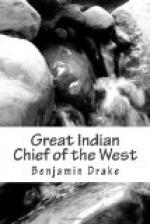Black Hawk never made any claims to the office of a peace chief. Even as a war chief, he was not recognized by all the tribe to which he belonged. A fragment of the Sacs and Foxes, however, followed his banner for more than twenty years, and acknowledged him in that capacity: and, over them, he certainly exercised, from their confidence in his judgment, his warlike talent, or some other cause, no small amount of influence. His age and kindness of disposition, probably, strengthened their attachment to him. In the campaign of 1832, although terminating in the defeat of Black Hawk, and the almost entire annihilation of his band, his military reputation did not suffer much, if the circumstances under which he was placed, be recollected. During the operations of that period, General Atkinson estimated the warriors of Black Hawk at seven or eight hundred, but the better opinion is that it did not, at any time, exceed five hundred; and several persons, who had favorable opportunities for judging, place the estimate still lower. The commander of the United States troops, had with him, in the pursuit of Black Hawk, twenty seven hundred men, all of them well armed and most of them well mounted. This was independent of the militia in the different military posts and fortified stations. The entire number of the American forces, engaged in the campaign, is supposed to have approached to three thousand, five hundred. Black Hawk was encumbered with the wives and children, the household property and travelling equipage of his whole band; and from the time of his recrossing the Mississippi to the battle of the Bad-axe, was constantly in want of provisions. Indeed, in the month of July, many of his party actually starved to death. Under such circumstances, the wonder is not, that he was finally defeated and captured, but that it should have required a campaign of three months in which to accomplish that object. The defeat of Stillman and the attack upon the fort at Buffalo Grove, may be claimed by Black Hawk and his band, to have been as honorable to their arms, as were the victories of the Wisconsin and the Bad-axe to those of the United States.
But whatever may be the ultimate opinion in regard to him, either as a warrior or a man, his career for good and for evil, is now ended. The war-banner has passed from his hand—his seat in the council-house is vacant—the fire of his lodge is nearly extinguished: the autumn of life is upon him—and, in a little while the autumn leaves will rustle over the lone grave of Black Hawk.
CHAPTER IX.
Black Hawk at the capture of Fort Erie—At the battle of the Thames—His account of the death of Tecumthe—His residence and mode of life after his last visit to the east—His Fourth of July speech at Fort Madison—His death and burial.
Since the three first editions of this work were published, the death of Black Hawk has occurred; and a few additional particulars of his life have been collected. These, it is proposed to embody in a new chapter.




